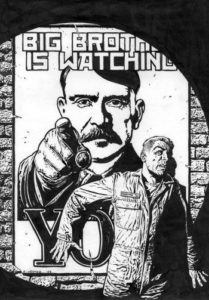Today there is much discussion about something called politicization. Most people don’t  pause to define the term when they us it thereby creating confusion. Since this essay is at its heart about the phenomenon of politicization, I pause to define the term as it is used here. Politicization means to require government through its passage of laws or by its punitive intervention into the lives of citizens by its bureaucrats or intervention by legislation, or intervention by court action for the purpose of authoritatively enforcing each citizen’s personal behavior and the cultural norms or social norms they are required to follow. That definition is quite a mouth full but it is necessary to reflect on each word to understand the nature and meaning of politicization
pause to define the term when they us it thereby creating confusion. Since this essay is at its heart about the phenomenon of politicization, I pause to define the term as it is used here. Politicization means to require government through its passage of laws or by its punitive intervention into the lives of citizens by its bureaucrats or intervention by legislation, or intervention by court action for the purpose of authoritatively enforcing each citizen’s personal behavior and the cultural norms or social norms they are required to follow. That definition is quite a mouth full but it is necessary to reflect on each word to understand the nature and meaning of politicization
The word politicization can, depending on context, also refer to political activity by a group of people, in or out of the government, meant to force this kind of government coercion to replace an area of citizen behavior that is still decided by the freedom of individual citizens. Politicization, i.e., state control of most or all citizen behavior, of all cultural and society norms is the hallmark of a statist society. In a statist society, there is an ever-present government person or persons exercising their authority to stand between citizens and dictate how they will interact, dictate what they may and may not say, and dictate what they may and may not do. This is the statist society.
In the absence of politicization, individual behavior and cultural and society norms are  determined by the citizens themselves based on their agreements or mutual acquiescence. A society that is largely absent of politicization, i.e., a society largely absent of government enforcement of behavior, is a civil society as opposed to a statist society. When citizens cannot agree or voluntarily acquiesce they simply go their separate ways.
determined by the citizens themselves based on their agreements or mutual acquiescence. A society that is largely absent of politicization, i.e., a society largely absent of government enforcement of behavior, is a civil society as opposed to a statist society. When citizens cannot agree or voluntarily acquiesce they simply go their separate ways.
The United States was founded as a primarily civic society and was designed with limited government intervention and little government enforcement of cultural and societal norms. Behaviors and norms were to be determined by volitional agreements between citizens. These volitional agreements were to negotiated within a skeletal framework of a few and basic laws. Only when one citizen claims another citizen has violated an agreement does is the power of government invoked to arbitrate or enforce behavior.
This civil design has changed in the United Sates over the last hundred years, particularly over the last thirty years, and most particularly over the last ten years. The change has been executed without constitutional due process. More about this in later essays. The original civil design has been abandoned and in its place the process of gradual politicization has instituted a draconian statist society where government bureaucrats, legislators, and courts dictate and enforce the details of behavior of every individual and dictate every cultural norm. Almost nothing is left for free individuals to negotiate between themselves. America has become statist and is no longer has much left of its former free civil society. The transformation was brought about by the process of removing most of our individual free choices through politicization i.e., government control of almost all behaviors and norms.
Those who responsible for the transition and those currently seeking to ensure that there can be no return to a largely free civil society claim that the statist society run by an elite and dictatorial ruling class is far better for the citizens than a free civil society where the citizens decide behavior and norms on their own. And while there can be distinct advantages to a mixed statist-civil society, there are hideous and terrible flaws with what the new American authoritarian state has wrought. I will attempt to explore these flaws in future essays.
